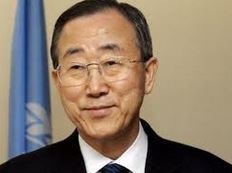UN: Education and Youth Unemployment Issues Must be Addressed Now

Ban Ki-moon, UN Secretary-General
The process of establishing a post-2015 development agenda must include youth input and participation to reflect the issues that concern them, UN Secretary-General Ban Ki-moon’s Envoy on Youth stressed in late March.
“We are at a crossroads. With 1,000 days left to meet the Millennium Development Goals (MDGs), we are discussing and trying to set the new priorities for the post-2015 development agenda,” said Ahmad Alhendawi, referring to the eight anti-poverty targets with specific objectives on poverty alleviation, education, gender equality, child and maternal health, environmental stability, HIV/AIDS reduction, and a ‘Global Partnership for Development.’
“This is definitely an opportunity where young people can participate in setting the agenda, and then own this agenda by being equal partners in its implementation and evaluation,” he told reporters in New York via satellite from Dakar, Senegal, where he is attending the World Education Forum.
Mr. Alhendawi stressed that with 1.2 billion young people globally – the largest ever population of young people – issues such as education and unemployment need to be addressed by policymakers.
“Youth unemployment figures are daunting,” he said. “Some 425 million jobs need to be created in the next 15 years, and the situation so far is not promising.”
Mr. Alhendawi said that during his mandate he would not only work with different UN agencies to enhance their programmes on youth, but he would also be a messenger between the world body and young people and would promote the creation of structured mechanisms for youth participation at a national, regional and international level.
“This is a two-way communication,” he said. “This includes carrying the voices and messages of young people back to the Organization and opening channels of communication between youth and the United Nations.”
He added that he would also work with marginalized youth, including women and girls, to involve them in development processes, and give them access to information, as well as advocate for a stronger, youth-friendly development agenda.
You may have an interest in also reading…
Europe’s Original Sin and the Dangers of Doing Good
Carlos Rangel, the Venezuelan diplomat and essayist, once pointedly remarked that western nations often send their failed politicians – the
Otaviano Canuto & Matheus Cavallari, World Bank: Bloated Central Bank Balance Sheets
Central banks of large advanced and many emerging market economies have recently gone through a period of extraordinary expansion of
Quantitative Easing: Another Shot for the Caffeine Junkie
Early in March, the European Central Bank (ECB) announced its intention to flood the market with about €1.1 trillion in

















































































